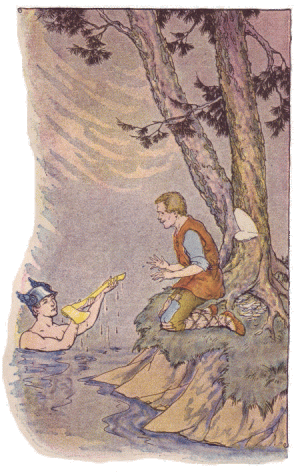 A woodman was felling a tree on the bank of a river, when his axe flew out of his hands and fell into the water. He was lamenting his loss and Mercury appeared asking him the reason for his grief; and on learning what had happened, dived into the river and, bringing up a golden axe, asked him if it was his. The woodman replied that it was not and Mercury dived and, bringing up a silver axe, asked him if that was his. “No” said the woodman; once more Mercury dived and brought up the missing axe. The woodman was very happy an Mercury was so pleased with his honesty that he made him a present of the other two axes. When the woodman told the story to his companions, one of these determined to try his luck for himself. He went to the edge of the river and contrived to let his axe drop into the water. Mercury arrived, dived and brought up a golden axe. “That’s mine” sayd the man but Mercury was so disgusted at his dishonesty that, not only declined to give him the golden axe, but also refused to recover for him the one he had let fall into stream.
A woodman was felling a tree on the bank of a river, when his axe flew out of his hands and fell into the water. He was lamenting his loss and Mercury appeared asking him the reason for his grief; and on learning what had happened, dived into the river and, bringing up a golden axe, asked him if it was his. The woodman replied that it was not and Mercury dived and, bringing up a silver axe, asked him if that was his. “No” said the woodman; once more Mercury dived and brought up the missing axe. The woodman was very happy an Mercury was so pleased with his honesty that he made him a present of the other two axes. When the woodman told the story to his companions, one of these determined to try his luck for himself. He went to the edge of the river and contrived to let his axe drop into the water. Mercury arrived, dived and brought up a golden axe. “That’s mine” sayd the man but Mercury was so disgusted at his dishonesty that, not only declined to give him the golden axe, but also refused to recover for him the one he had let fall into stream.
Honesty is the best policy.
Questa è una vecchia edizione economica del 1933 nella traduzione di Vernon Jones e illustrata da Arthur Rackham. La tengo sempre sul mio comodino. Il fatto è che sto studiando la figura di Mercurio, o meglio, la figura di Hermes nella dicitura greca, di cui più avanti vi parlerò: la cosa divertente è che, per puro caso (?), ho trovato il libro delle Aesop’s Fables aperto proprio su questa favola. Non è fantastico? Questo è un indubbio esempio di sincronicità. A proposito, vi invito a scovare nella vostra vita altrettanti esempi, ne è satura la nostra esistenza e spesso non li notiamo. Male.
Vi traduco sommariamente la favola:
un boscaiolo stava abbattendo un albero sulla riva di un fiume quando l’ascia gli scivolò dalle mani e cadde nell’acqua. Si stava lamentando ed ecco Mercurio gliene chiese il motivo e si tuffò nell’acqua ed emerse con un’ascia d’oro. Il boscaiolo negò che fosse sua; Mercurio si rituffò ed emerse con un’ascia d’argento e di nuovo il boscaiolo negò che fosse sua; quando finalmente Mercurio gli portò la sua ascia il biscaiolo fu felice. Per premiare la sua onestà il dio gli fece dono delle altre due asce, quella d’oro e quella d’argento. Il boscaiolo raccontò la storia ai suoi amici e uno di loro decise di fare il furbetto e ripropose la stessa scena; Mercurio gli apparve e si tuffò emergendo con un’ascia d’oro, al che l’uomo disse, mentendo, che era la sua ascia. Mercurio si indispose e non gli riportò nemmeno l’ascia che l’uomo possedeva e che aveva volontariamente gettato nel fiume. Della serie: l’onestà è una garanzia.
E se fosse così anche per noi non sarebbe più bello?
Se pensiamo che Esopo scrisse le sue “favole” nel VI secolo a. C., da una parte potremmo consolarci pensando che allora la gente non fosse migliore di adesso ma, al tempo stesso, dovremmo rammaricarci pensando che, in tutto questo tempo, non è cambiato proprio niente.
